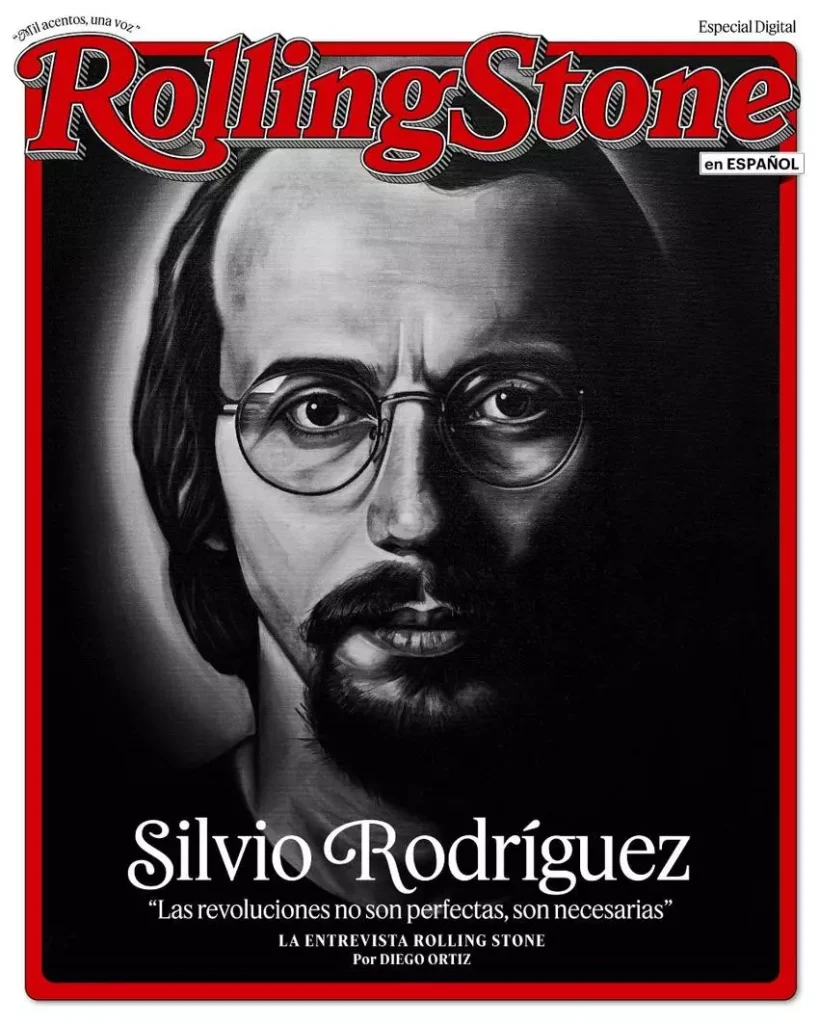An interview with Cuban singer-songwriter Silvio Rodríguez, featured on the cover of Rolling Stone magazine in Spanish.

![]() 14ymedio, Madrid, October 22, 2025 — The entire cover of the Spanish edition of the prestigious American music magazine Rolling Stone features the face of Silvio Rodríguez, who at almost 79 has just published Álbum Blanco para Silvio Rodríguez, an album made up of eleven previously unreleased songs by the Cuban singer-songwriter, created between the late 1960s and the first half of the 1970s, and which was presented this Monday in Havana.
14ymedio, Madrid, October 22, 2025 — The entire cover of the Spanish edition of the prestigious American music magazine Rolling Stone features the face of Silvio Rodríguez, who at almost 79 has just published Álbum Blanco para Silvio Rodríguez, an album made up of eleven previously unreleased songs by the Cuban singer-songwriter, created between the late 1960s and the first half of the 1970s, and which was presented this Monday in Havana.
The interview, published this Tuesday by Rolling Stone and reproduced this Wednesday by Cubadebate, was conducted by the director of the media, Diego Ortiz, in the house that the troubadour owns in Havana and is a very extensive dialogue that revolves around Rodríguez’s culture, his influences in music and poetry and the history of the so-called Nueva Trova Cubana of which he is already almost one of the few living and active representatives.
Inevitably, politics takes over in Rodríguez’s case, and to such an extent that an interview so clearly focused on music is titled with the quote “Revolutions are not perfect, they are necessary.” In the conversation, the singer-songwriter—who was also a member of the Cuban Parliament—makes it clear that his admiration for Fidel Castro remains intact.
“I’ve never felt disillusioned with the Revolution, ever. Disillusioned with some people, yes, of course.”
“Fidel was a brilliant man, there’s no doubt about that. He was a highly cultured man. Fidel was an intellectual, an intellectual lawyer. He read like crazy, knew everything, and was extremely well-informed. And he had charisma, a history, and an unquestionable track record. Continuing this without Fidel isn’t easy, it’s not easy. But it has to be this way, it has to be this way,” he says. The artist responds to the interviewer’s interrupted question, which suggests a comparison between the Cuban and Venezuelan regimes and the right-wing dictatorships in Latin America of the last century.
“Revolutions aren’t perfect, they’re necessary. Those who make them are human beings like you and me, who aren’t perfect, so in one area of the revolution, you see wonders happening, and in another, they’re doing crazy things,” Rodríguez apologizes, arguing that there is no perfect system, neither capitalism nor socialism, which he considers to be still underdeveloped and whose deployment should be adapted to the conditions of each country.
The singer-songwriter believes, on this point, that Cuba has been unable to do what it would have liked because of the measures of the United States. “Cuba is a country that has been, more than blockaded, I would say tortured. It has been subjected to a very conscious, intentionally perverse torture by a declining but extraordinarily powerful empire that controls practically everything in the Western world, and we are, geographically, part of the Western world and are 90 miles away from those people,” he specifies.
The singer-songwriter, on the other hand, very clearly rejects the idea that the embargo has affected his career as an artist when the interviewer asks him if he thinks he hasn’t been to the Latin Grammys for that reason. “They invited me, I don’t remember if it was in 2015 or 2016, or 2014. They invited me to present me with a Grammy for Musical Excellence,” he explains. According to his testimony, the organization wanted him to travel to Las Vegas to collect the award, something he found “tempting” since he’d never been, but which he had to decline due to his commitments. “I asked them if they could give me the Grammy at a neighborhood concert, inviting them to come to Cuba for that, and they told me no, that it was a hassle for them, because if they did it for one person, going to another country, they’d have to do it for someone else,” he explains.

Although Ortiz insists it is striking that someone with his career hasn’t won multiple awards from the Miami-based Latin Academy of Recording Arts and Sciences, Rodríguez insists on avoiding confrontation on this point. “They took me into account that time, and it’s good to let it be known that we simply couldn’t meet,” he argues, pointing out that he, too, doesn’t have a profile that corresponds to those awards. “I have nothing against that world; it’s great that it exists; that’s part of the entertainment for people. Besides, there are very good, extraordinary artists in that world, without a doubt. But it’s not my thing.”
Rodríguez reviews some other issues, including his time in the Army (he did active military service and was in Angola as a volunteer, but considers the Cuban Armed Forces defensive rather than offensive); his friendship with Gabriel García Márquez; the ideological roots of Nueva Trova (which he traces back to Bob Dylan and Atahualpa Yupanqui); and various political issues ranging from his opinion of the Spanish Prime Minister to the war in Gaza.
He also recounts that at a very young age, he had a run-in with officialdom—much less severe than what some, he claims, suffer—which he quickly overcame. The artist was 21 years old when, fresh out of high school, he was signed to a music television show. “Suddenly, one day, because of an argument, they took me off television and radio, they erased me from national broadcast radio. They banned the airing of my songs,” he reveals.
However, his conclusion was that such attitudes were not representative of the system, but rather of malicious people: “This man is not the Revolution, and no one can throw me out of the Revolution anymore,” he told himself. And he remained loyal to Castroism.
In recent years, Silvio Rodríguez has been moderately critical of Miguel Díaz-Canel’s government and some of its decisions, and in this interview he was no less so. When asked if he has ever felt disappointed with the system he supported, he replies: “I have never felt disillusioned with the Revolution, never. Disillusioned with some people, yes, of course. And not even disillusioned, but simply: ‘What’s wrong with this guy?’ [laughter ].” ‘What’s wrong with this guy?’ he says, openly.
____________
COLLABORATE WITH OUR WORK: The 14ymedio team is committed to practicing serious journalism that reflects Cuba’s reality in all its depth. Thank you for joining us on this long journey. We invite you to continue supporting us by becoming a member of 14ymedio now. Together we can continue transforming journalism in Cuba.
